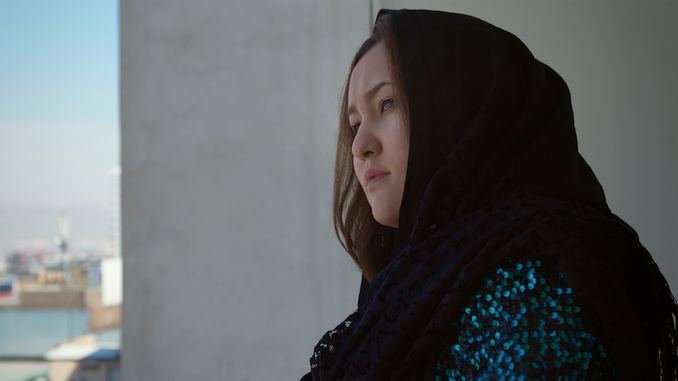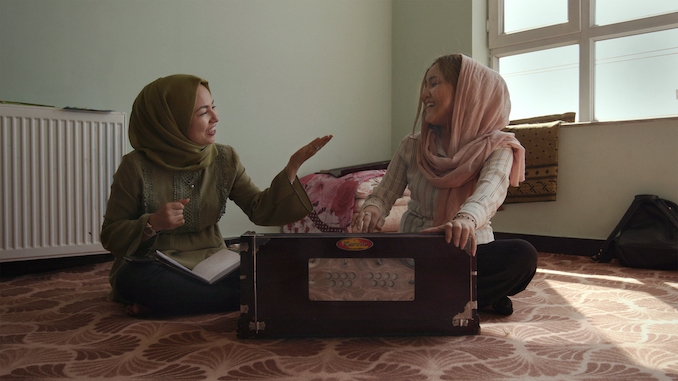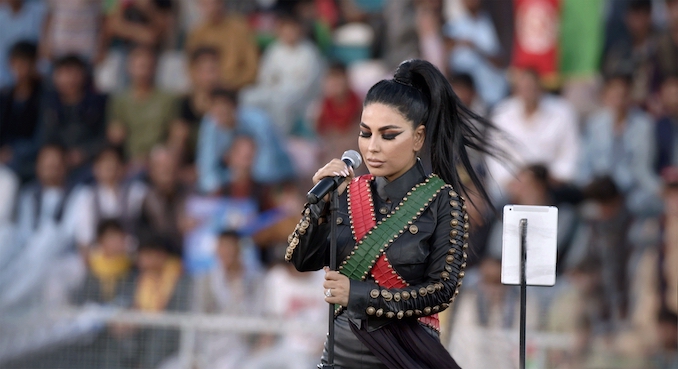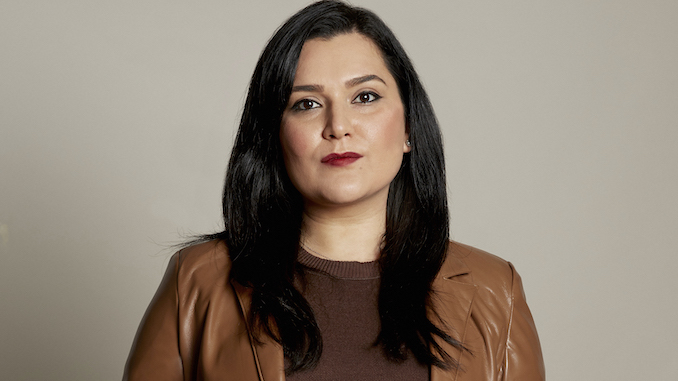AND STILL I SING is a beautiful documentary by Fazila Amiri, an Afghan-Canadian director, about three women in Afghanistan fighting for women’s rights through Music. We watch the massive strides these women are making, and then in the last 15, we see 20 years of progress wiped away because the Taliban has retaken Kabul and, therefore, control of Afghanistan. The 90-minute feature is hopeful yet sorrowful.

The documentary plays with your emotions. As a white woman who grew up in Canada, it was extraordinary to see these women living their lives under constant threat even before the Taliban took over again.
Zahra Elham and Sadiqa Madadgar are ethnic Hazara women and contestants in the 14th season of Afghanistan’s hit TV show Afghan Star. Zahra is born to a middle-class Afghan refugee family in Pakistan. Sadiqa is from the Ghazni province of Afghanistan; when her family fled to Pakistan during the worst of the war, she and Zahra met at school. During their time on Afghan Star, the two girls room together in the show’s guest houses. We follow their journey on the show, their other interests and goals, and their family’s support or condemnation.

Aryana Sayeed, an Afghan national and global singer was the building block for the documentary for Fazila Amiri when they first met in a restaurant; the project took off in 2018 with support from Telefilm. In Kabul, Afghanistan, Aryana began planning her dream concert at Ghazi Stadium, a prominent sporting venue previously used by the Taliban as an execution site. At the same time, she’s participating in Afghan Star as a judge and mentor to Zahara and Sadiqa. Aryana acts as the glue to the documentary. We see her on talk shows, news cycles, and posing for photos, all in the name of women’s rights in Afghanistan. Aryana’s views are so controversial, and her celebrity so influential that multiple Taliban warlords put a Fatwa on her – essentially a bounty for her death. Still, she persisted: AND STILL, I SING.

Watching these three women through their trials is captivating and inspiring. We watch Sadiqa biking around Kabul, studying Law at University, and training in MMA; Zahra and Sadiqa walk around without male escorts; they go bowling. And then we see them threatened and discriminated against; called prostitutes and whores. When Zahra wins Afghan Star, becoming the first female contestant to win, we see the father of the losing male contestant threaten to bomb the studio. The juxtaposition of it all is baffling.
I sat with AND STILL I SING director, Fazila Amiri, to discuss her film and what it was like for her. Fazila was born in Kabul, Afghanistan, but in 1996 when the Taliban regime seized power, her family fled and became refugees. She’s spent most of her life in Canada, getting her BFA in Film Studies from NSCAD University and her MFA in Film Production from York University. She travelled to Afghanistan frequently as a student, reconnecting with her roots. “During my travels, I realised the emergence of culture and music back to the city’s streets in Afghanistan and how women took part in the culture and art sector, and that was inspiring to see.” As Afghanistan was affected by the war, as always, the arts were the first to disappear, but “Music has very indigenous roots in the country and history, that’s the main source of entertainment: television and Music. It was interesting to see the diaspora singers return to the country to rebuild the music industry. And I was part of that generation who dreamed of going back, helping rebuild and tell stories through our narrative.”

Fazila had finished AND STILL I SING completely; she was about to start sending her film to festivals when the news broke that the Taliban had regained control over Afghanistan. Her first move was to try and help her Arghan subjects and crew out of the country, knowing there would be targets on their heads. Aryana could get to Turkey on a military plane; Zahra fled by land into Pakistan, but Sadiqa couldn’t get out; she was stuck in a refugee camp for nearly a year before being accepted into Germany. The film, however, ends with Sadiqa still in Afghanistan hiding from her family and the Taliban, left behind and hopeless. She told Fazila repeatedly that she knew she might die there. And this is the feeling Fazila wants the audience to sit with: the sense of abandonment, the universal feeling of women in Afghanistan right now.
AND STILL I SING opens theatrically at Hot Docs cinema on October 21st with a special Q&A at 6 pm with the director Fazila Amiri and Afghan singer Aryana Sayeed. Don’t miss it!



